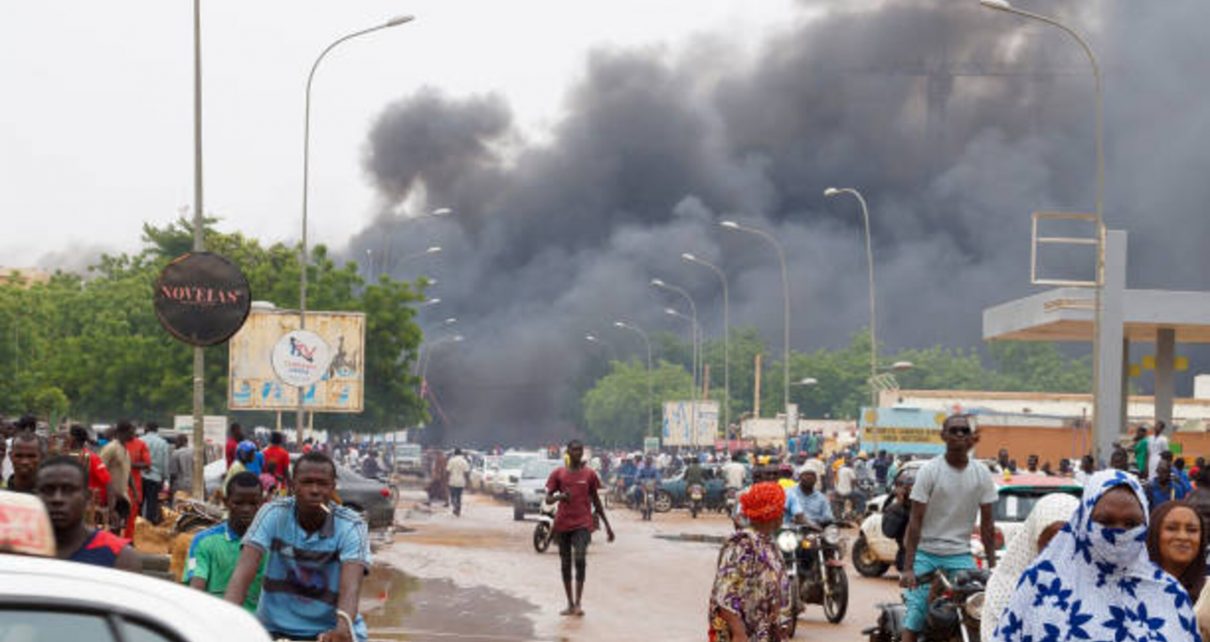
EXACTLY 70 years separate the July 26, 1953, suicidal attack on Moncada Barracks by Cuban youths who wanted to remove the military from power, and this Wednesday’s coup in Niger Republic which removed elected President Mohamed Bazoum and restored military rule.
The coup plotters, styling themselves as the National Council for the Safeguarding of the Country, said in a speech by Air Force Colonel Major Amadou Abdramane that their treasonable move “is as a result of the continuing degradation of the security situation, the bad economic and social governance”.
Indeed, Niger, like many other African countries, is a paradox. It is one of the poorest countries in the world with 41 per cent of its 20 million people living on less than a dollar. It depends a lot on aid. Nigeria under former President Muhammadu Buhari in 2022, provided N1.4 billion worth of vehicles to run the government and also took loans to build a railway from Nigeria into Maradi in Niger Republic. Yet, it is rich in minerals such as oil, silver, salt gold, gypsum, coal, tin, iron ore, phosphates and uranium. Indeed, it has the fifth largest uranium deposits in the world. Its primary problem, like that of many African countries, is that its wealth is controlled by foreign companies and countries.
Although bodies like the United Nations, the African Union, the Economic Community of West African States, and countries such as Nigeria, Benin, the United States of America and France have condemned the coup, the plotters are consolidating. In any case, who knows the backers of the coup?
In the case of Cuba, six years after their first attempt, the youths led by colourful historical figures like Fidel Castro, Camilo Cienfuegos, Haydee Santamaria and Ernesto Che Guevera not only removed the military from power but also disbanded it. In its place, flowered a new military loyal to the Cuban people. Since then, nobody has dared to organise a military coup in that country.
In contrast, within two decades of saying farewell to coups in Africa, they have simply multiplied. Abdel Fattah el-Sisi who styles himself a Field Marshall, executed a brutal coup on July 3, 2013, murdered scores of Egyptians, allowed elected President Mohammed Morsi to die in prison due to lack of medical care and turned the country into a huge prison where the rule of law is not respected. Tragically, Sisi who also became Chairman of the African Union, is the toast of so-called advanced countries.
In Sudan, the military led by General Fattah al-Burhan in April 2019, imposed itself on a popular uprising. It then aligned itself with the rogue elements of the murderous Sudanese Arab Janjaweed militia, now renamed the Rapid Support Forces, to soak the country in the blood of its patriots. On April 15, 2023, the Sudanese military and the Janjaweed turned their weapons on each other, drenching the entire country in blood. Within three months of this senseless conflict, the Sudanese coup plotters have killed over 2,000, displaced 2.2 million people from their homes, forced about 550,000 into exile and some 25 million people in desperate need of basic needs like food.
There have also been coups in Mali and Burkina Faso while there have been strenuous efforts not to classify the April 20, 2021, coup in Chad by General Mahamat Deby, as a coup. There is also the Ivorien President Alassane Ouattara imposing himself in October 2020 on the country through an unconstitutional third term and declared himself re-elected with 95.31 per cent of the votes. What is this if not a coup?
Coups succeed in Africa mainly because the people are alienated from the state and their leaders who are guarded by Praetorian guards. So all that is required, is for these guards to conspire, arrest the President, and a coup is on. That was what happened to Guinean President Alpha Conde in 2020 after he imposed himself for a third term. That is what happened this week to President Bazoum whose presidential guards put him under arrest.
In all these, the populace who are continuously pushed into extreme poverty by the programmes and policies of the government in power, hardly see the need to sacrifice their lives in defence of such governments.
This is in contrast with the situation in Cuba since 1959 where anybody that dares to organise a coup, knows it has the populace to contend with as there would be massive resistance in the streets. I had concluded that a military coup is virtually impossible in Cuba when I visited the island as a young journalist in 1986.
The first morning I went out in the streets, I came across columns of people in army uniform cleaning the gutters and emptying drains. I asked my Cuban friend who these people were and he confirmed they were serving soldiers. Later, I came across building sites and the builders were soldiers.
I asked my friend why soldiers were so deployed, and he answered that since the country was not at war, what else would the soldiers be doing? How will they earn their pay? I reflected that back home in Nigeria, the soldiers simply report at their offices, do some parade and go home. In the evenings when I went out, the Cuban government had bands in the streets with free beer and people dancing. There were soldiers drenched in sweat drinking and dancing with no difference whatsoever from the rest of the populace, who back in Nigeria, are called ‘bloody civilians.’
I discovered that military service for Cubans from age 18 was routine, especially after high school or tertiary training. Even now, under its National Defence Act No. 75, Cubans routinely go for two-three-year military training. So, in a country where virtually every adult you meet has military training, which soldiers would be crazy enough to want to carry out a coup? This is besides the fact that, unlike nearly all the armies in Africa, the Cuban army is pro-people and not neo-colonial. There is also the fact that the loyalty of the Cuban military to the elected government of the country can be taken for granted.
This Wednesday evening, the Cuban Charge D’ Affairs, Pavel Bauza on behalf of new Ambassador Miriam Morales Palmero, filled in guests on the effects of the July 26 uprising and how Cubans despite over six decades of US sanctions and blockade, have built a country that cares for all its citizens. A country that provides one of the best healthcare systems in the world for all its citizens; in which the right to work and education are guaranteed, and literacy is almost 100 per cent. As he spoke, I reflected that the antidote against coups is the people.


